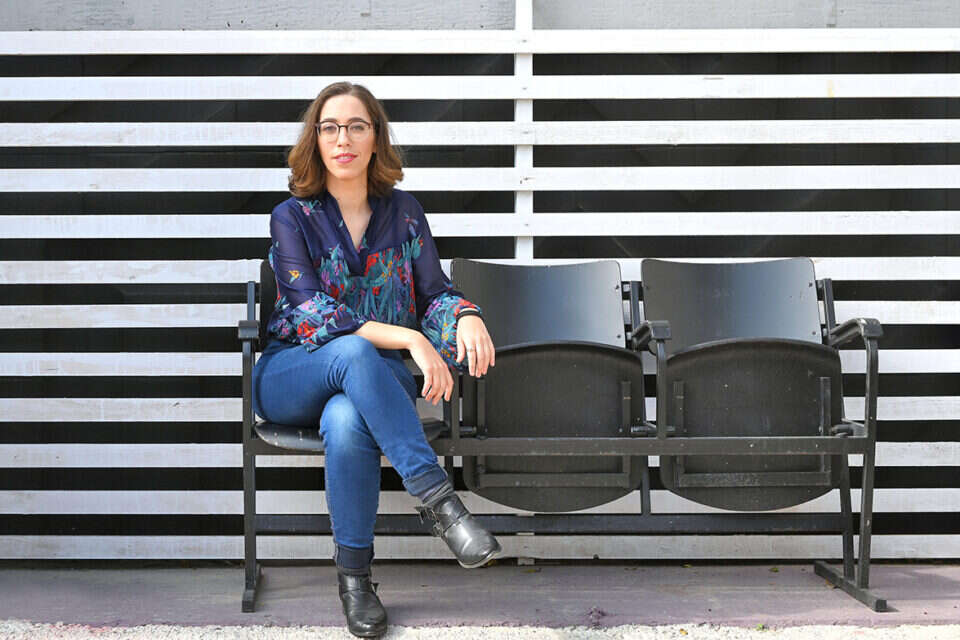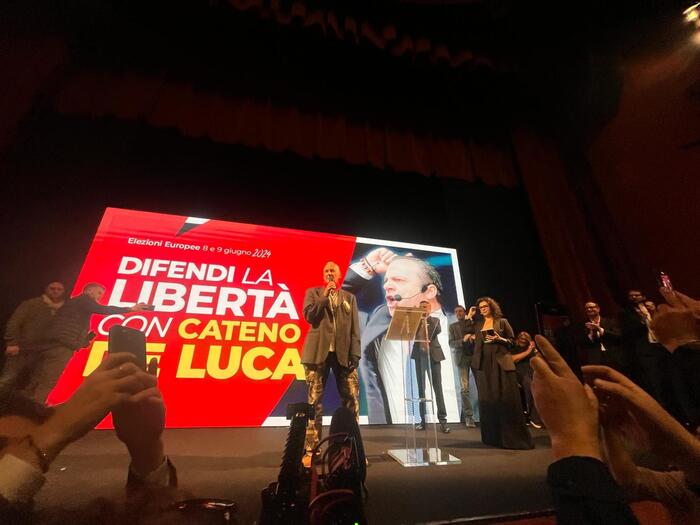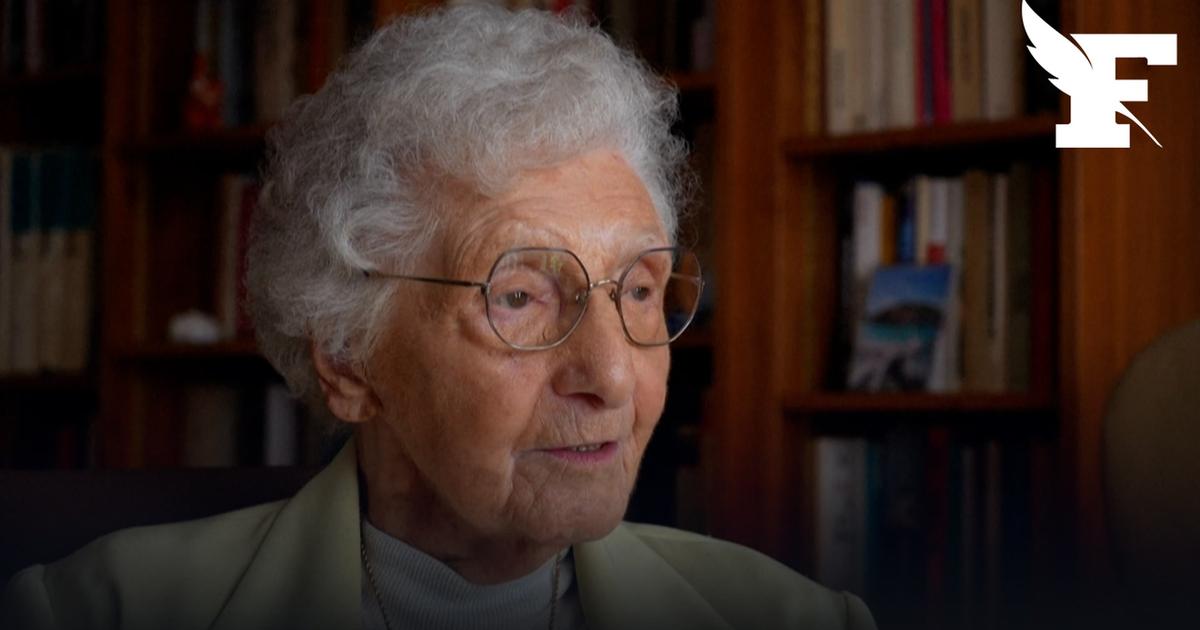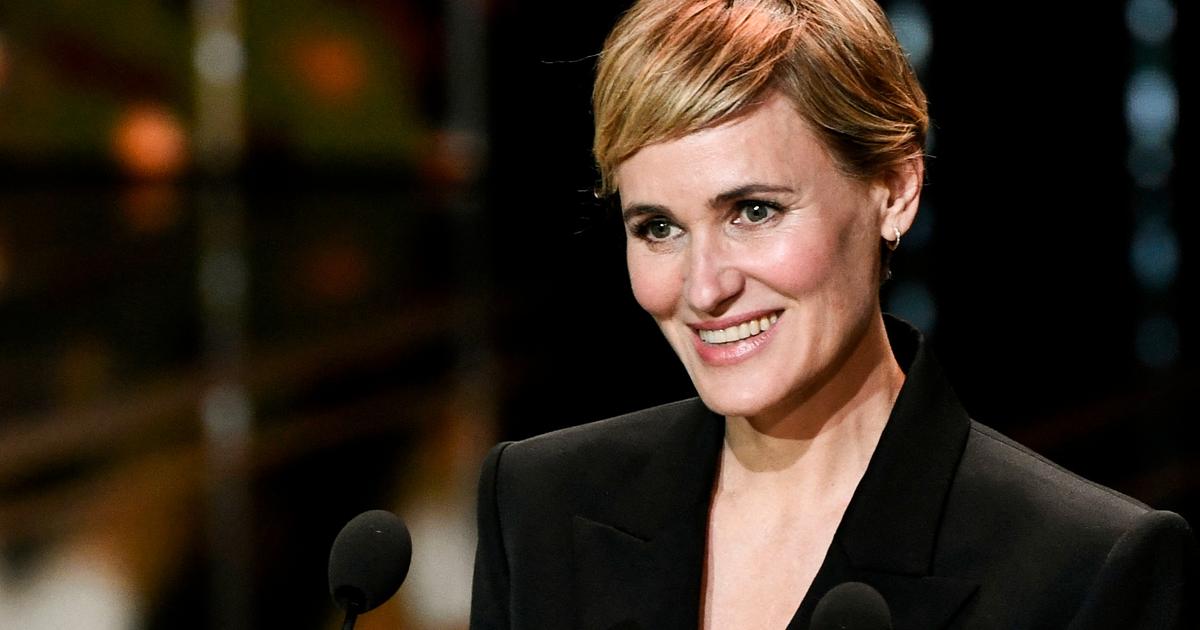At the end of 2017, Ilail Semel lost her mother, the late writer, poet and playwright Nava Semel, who died of cancer.
"My mother, who passed away at the age of 63, is with me every day, in everything I choose to do. When I have a hard day, I actually hear her say to me 'you are the best and most talented, they do not understand anything' - things I would hear from her all my life .
"Now that I'm dealing with 'Romeo and Juliet,' I know how much my mother, who was a hopeless romantic, would have enjoyed digging with me in this text. There's nothing she loves more than talking about love, I inherited it from her. We were so close, and I hear her "Even without sitting in the front row."
Today, after two complex years that she said was greatly affected by the loneliness and alienation she felt in Corona, the 31-year-old symbol's adaptation bridge to Shakespeare's Romeo and Juliet, one of the greatest love stories of all time, will be staged.
"I was sitting in the first closure at home and I wanted something that would lift my spirits," she explains.
"I dreamed of the day when we would all leave home and engage in love and romance. This period is a lesson in flexibility and creativity, and we are still dealing with uncertainty in production. We have discovered verified players for the virus, and I consider the possibility that there will be rejection."
Countless productions of "Romeo and Juliet" have come up over the years. Why again?
"Something in Corona made many creators around the world stage the play again. It seems to me that right now everyone wants to fall in love. When I was 8, I watched Franco Zapirelli's 1968 Romeo and Juliet, which aired late. I was alone, not knowing they were both dead in the end. "I cried all night and wrote songs about them. Now I feel like I're back to that girl. I want the audience to go back to his first love, just like me."
• • •
When a symbol speaks of culture and theater, her eyes sparkle.
After all, this is the world into which she was born, as the daughter of the late Nava and Noam Semel (75), currently the director of Habima and formerly the director of the mythological chamber and director of the Haifa Theater.
You were born into a house of cultural foundations. Was there at all an option not to be sucked into this world?
"My twin brother is not involved in the field, so it is an indication that there is an escape route ... My parents were always interested in people, each from his own angle. My mother had a deep interest. She would sit for conversations with the taxi driver, the man from the grocery store, the first person she met - And really listened to the stories of their lives.
"My father is interested in the people in the group, how they behave, what will bring them to the theater. To me, the world of culture is a world where you examine what it is to be human. I think I did not just find myself on a bridge, a theater run with passion and passion for art. I do not know Something else".
• • •
She studied visual arts at Thelma Yellin, but said she never aspired to play.
In the army she served as an intelligence officer, and after her release she worked as an assistant to the late director Roni Pinkovich ("I discovered that commanding four actors in a children's show is much more difficult than commanding 40 soldiers").
She later studied theater at Tel Aviv University, and in her graduate project she staged the "murder" of Hanoch Levin, two weeks before her mother's death.
In recent years, she has been leading the Gesher Studio at the Gesher Theater, which integrates young actors into the theater's repertoire.
In 2019, she directed "Who Like Me" as part of the studio, based on a play by Roi Chen, in which the studio actors played teenagers who are dealing with mental disorders and are hospitalized in a closed ward.
The production has become a hit and is also shown to high schoolers and teens.
"Romeo and Juliet" is her second round with the young cast.
Along with 18-year-old Noam Frank (son of actor Gil Frank) and 20-year-old Neta Roth (Yair Lapid's niece), the main roles are also played by Gilad Kletter, Uri Yaniv, Karin Sruya, Tali Osadchi, Sofia Golan (daughter Of the actor Yishai Golan), Ruth Sandrovich (daughter of the actor Alexander Sandrovich), Nir Canaan, Itamar Peres and Agam Oselbo.
Dori Perens is responsible for the contemporary and fluent translation.
Is working with the young people intended, for you, to attract a younger audience to the theater?
"Sure. We were born with a screen in hand, and I want to expose as young people as possible to the stage. I saw it in 'Who's Like Me.' When boys and girls see actors their age - it drives them crazy and touches them.
Shakespeare is already a different league. A challenge for every director.
"I feel a great responsibility to go out in a Shakespearean production. On the one hand, who am I the little one and the young one, but I draw inspiration from two giants who passed away this year: Omri Nitzan, who was like my uncle and I want to make him proud, and Yevgeny Arieh, whom I did not know but grew up on 'Dream "His summer night. From both of them, as spiritual fathers, I draw a lot of inspiration and courage."
• • •
We meet in the Tel Aviv apartment she has been sharing with her partner of the past eight years, Nitzan Lotem, a social worker and filmmaker, and with the dog Choco.
She and her twin brother Nimdur, an independent news coordinator on the environment and climate crisis, were born in New York, when her father served as Israel's cultural consul there.
Their older brother, Air (42), is a musician.
"My and Nitzan's love story is very much not Romeo and Juliet," she smiles.
"We met in the army, in an officers' course, and we were very good friends. He was a real housemate with us. My family kept asking why we were not together, and I would answer that I did not want to ruin the friendships between us.
"It was only after four years that I did something. One day Nitzan called and we decided to go to the movies. On the phone he laughed terribly at me, so at the end of the conversation my mother ran to me from the study and said: 'Ilail, someone who makes you laugh like that this is something'.
"In the movie itself he treated me like his sister, the most unromantic thing, and I was sure I would come home and disappoint my mother. But at the end of the evening he suggested we go to his apartment for coffee, and then I thought for mother - I do it. I kissed him, and since we together".
What about marriage and children? Aren't you being bullied in the family for it?
"Almost all the plays I have directed have an anti-establishment and anti-marriage line. I laugh with Nitzan that there is always a nightmarish wedding scene in my plays, as if I am really against. But I am a spiritual person, from a home that respects religion and Jewish tradition, and I do not oppose the religious ceremony.
"The most beautiful wedding I was at was that of my cousin, Shiri Artzi, with Yiftach Klein. They got married after 20 years together, a surprise wedding that Argan will open for her 40th birthday. The whole family was waiting for them in a synagogue in Neve Tzedek, in a small and intimate section, and from there "We continued to the restaurant. It was a celebration of love that is already coming true, with their life together and children."
So Bud should just surprise you with a wedding.
"I have a girlfriend who got married in Corona, and she offered Nitzan to marry me by surprise, between the closures. But he told me about it, because he knew I still did not want to. I have a fantasy that someone else will arrange everything for us at the wedding, but as a freak control I want to know what "He will put together every part of the ceremony. I am confused. I really want children and a family, but I do not have to get married for it."
Noam Frank and Neta Roth in "Romeo and Juliet" on the bridge.
"After the corona, the world wants to fall in love," Photo: Michal Halabi
• • •
She is well acquainted with the mythological Friday meals at her family's home, which over the years have also been attended by her famous aunt (her mother's brother), Shlomo Artzi, and his family - including his daughter, Shiri Artzi, and her husband, actor Yiftach Klein.
"At these meals there was always a debate about what would survive: the theater or the music ... I believe in the power of music to tell a story, but I do not know how to sing. The joke he wanted in the family is that the singing talent passed on to the women. And songs - no. "
Your mother did not get to see you direct, but gave you the blessing of the road.
"True, she was with me during my studies, and in my graduate project she literally kicked me out of her bed. She was hospitalized with cancer in poor condition, and I was torn between her and the first show I directed. She told me, 'You have to go direct, "Go to rehearsals," and that's what a strong person she was. "
Since she passed away, you have been commemorating her work in Israel and around the world.
"For me, her spiritual will is a list of her works that she wanted me to father. She actually wrote for me. I have not yet come to touch on her texts, it is very difficult for me, but she wanted me to turn her books into plays, like 'Rat Laughter' became an opera.
"I can not yet imagine myself doing it without her, but I will get to it. The commemorative enterprise is first and foremost the greatness of my father's soul. To say that we do not want bridges and buildings named after her, but that her works will live after her and be accessible to as many audiences as possible. Aya Elia, manages it with us. At first we did a lot of events and initiatives, and now I're approached, at least once a month, by students who want a book or a play of hers. them".
What has changed most in the family following her death?
"We are still very close, but she was the beating heart of the family, a man who clings to his love, who attracts everyone to him. In the plague everyone shut himself in his house. We still meet a lot, but this animal, the beating heart, is no more."
I guess it's complicated to be the "daughter of" in a world where your dad is so familiar and controlling.
"It's both, but today I see much more of the positive sides. When I studied theater I deliberately went to university, so that I would swallow there among many students and not be the daughter of. I am a theater girl, whether I want to or not, and I can not escape it. I grew up in a house where Talking at meals about art and culture - as if they are the most important thing in the world.
"Today I say I received huge support from my parents - and this is the greatest gift in the world. As a child, when my dad would talk on the phone at his office work, I was in the stage accessories department, seeing how to make Styrofoam birthday cake. It felt like Disneyland, the most fun in the world."
Do you feel compared to your father?
"It's really problematic, because I'm expected first and foremost to be Noam Sergeant, and I'm not. Noam Sergeant has only one, and I feel I have to constantly live up to expectations, even though we do different things.
"I am expected to be at my father's level now, and I say that if I was - expect me to be at his level when he was 31, my age today. I am still learning and gaining experience. The world of theater is a small swamp with fanaticism and resentment.
"I do not suffer from it too much, but I do feel that when I walk around the repertory theater, I inherited some of my father's complex relationships with other people. There are those who because I am Noam Semel's daughter will not give me a chance, or make my life harder. "For every door that opens, there is also a door that closes."
Her parents, the late Nava Semel and Noam Semel. "A great gift", Photo: Itzik Biran
• • •
An active symbol in the "Theater Creators Forum", which promotes equal representation of women in directing, creative and management positions.
In the past year, the forum has launched a "fifty-fifty" campaign, which has received enthusiastic responses and cooperation from theater directors.
"I grew up on the feminism generation of my mother and her generation, who did not want to see themselves as women who experience discrimination. They said 'if you are as talented as men - you will succeed like them.' Our generation sees that it does not work that way. Because they are women.
"Right now, the numerical ratio of women directors and creators to men is 20 percent to 80. Our forum was founded five years ago informally by Noa Schechter and Tal Brenner, and a few months ago we held a big conference together, with a central panel where theater directors spoke. The conference was announced by Gilad Kimhi (the artistic director of the Cameri; MK) that he would strive for an equal repertoire of 50-50, and in all the theaters there was talk of the desire to include more women in the theater.
It exceeded all our expectations. "
The Jerusalem Khan Theater and the Haifa Theater are currently headed by women. Beit Lessin is run by a woman, who is also the artistic director there. The Be'er Sheva Theater also has an artistic director.
“It's wonderful that there are women who have reached the ranks of artistic management and CEOs, and need to celebrate that, but numerically there are still no 50-50 in the creative team, so need to continue to care.
I believe we will succeed. "
Do you have a dream to direct a certain piece or work with certain actors?
"I really want to touch on Mom's texts. 'Curved Head' is a book that I really like and want to adapt to the stage. I also want to write my own things. I want to conduct artistic theater, present our stunning culture to audiences abroad, in international collaborations, and touch Again in the Israeli-Palestinian conflict.
For me, theater is the way to talk about topics that interest me. "
Our "stunning culture" was very much marginalized during the Corona period.
"True, and I felt like a worldly sword. I kept getting a 'non-essential' label on my head. I thought I was doing theater out of passion and vitality, to talk about injustices, to touch on important social issues, so how could I not be vital? "It still accompanies me. The impact of this period on us will be seen in a few years in works on stage as well."
Maya19.10@gmail.com
Were we wrong?
Fixed!
If you found an error in the article, we'll be happy for you to share it with us




/cloudfront-eu-central-1.images.arcpublishing.com/prisa/BEHGGQZBURDSZG3TTV3Y6ERJCU.jpg)










